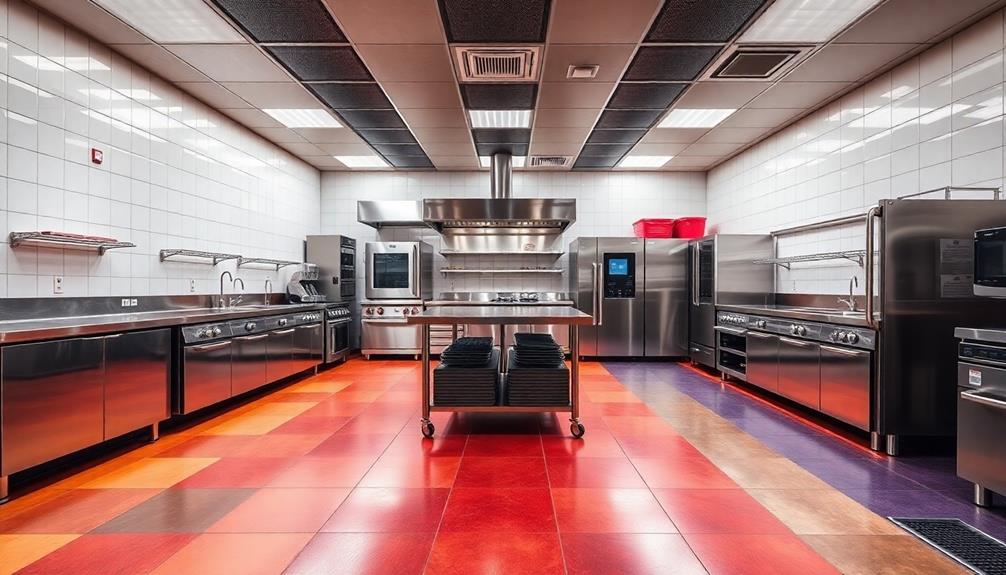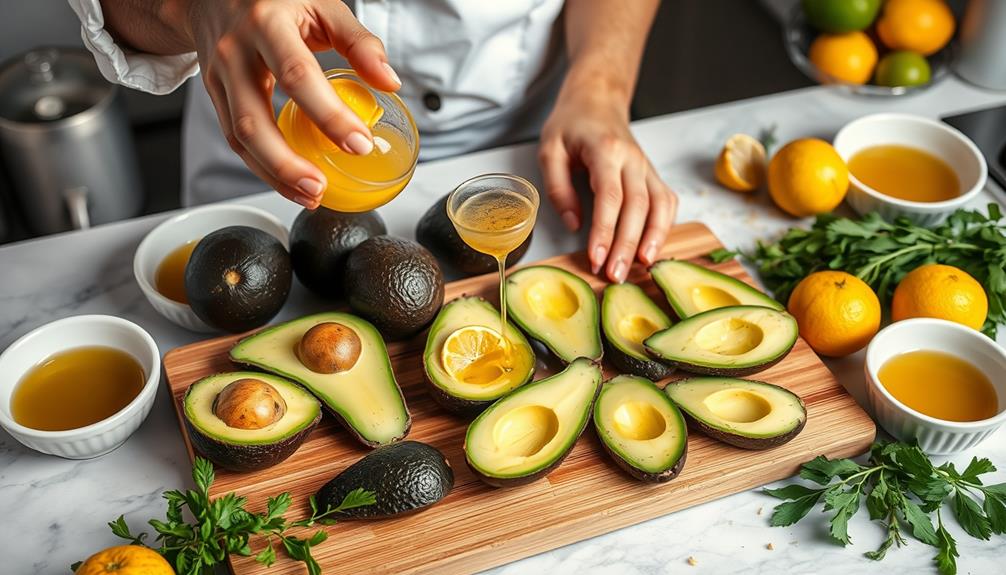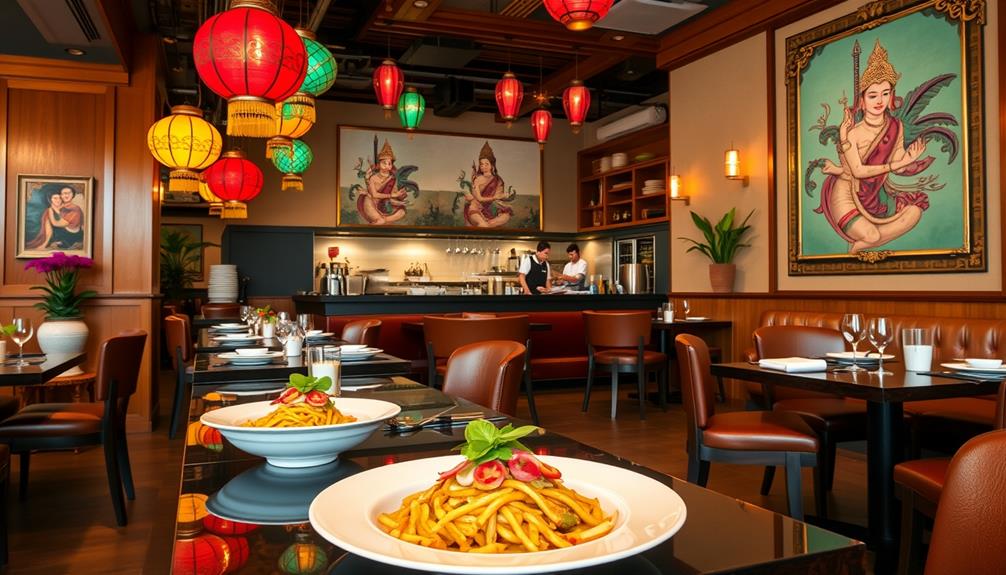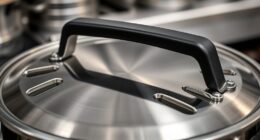When choosing the best flooring for your restaurant kitchen, consider options like epoxy, ceramic tile, and rubber. Epoxy flooring offers durability and slip resistance while being easy to clean. Ceramic tiles are great for high-traffic areas, as they resist heat and stains. Rubber flooring provides excellent grip but needs regular maintenance. Each type has its pros and cons, so think about your kitchen's specific needs. By exploring different materials and their benefits, you can find the perfect fit for your establishment. For more insights on making the best choice, there's plenty more to discover.
Key Takeaways
- Epoxy flooring offers durability and a seamless design, making it ideal for high-traffic restaurant kitchens with easy maintenance needs.
- Ceramic tile flooring is non-porous and heat-resistant, providing a stylish yet practical option that can withstand spills and heavy use.
- Vinyl flooring is a cost-effective choice with various styles, although it may not be as durable as epoxy or ceramic options.
- Concrete flooring, when properly maintained, can last over 20 years and includes antimicrobial properties with the right coating.
- Rubber flooring excels in slip resistance, providing cushioning but may require more regular maintenance compared to other flooring types.
Essential Qualities of Kitchen Flooring
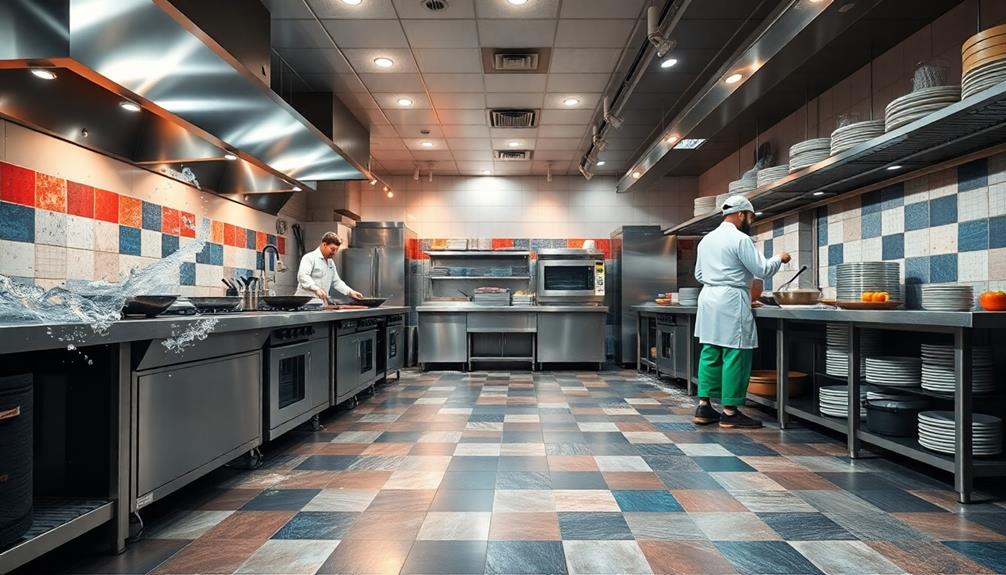
When choosing flooring for a restaurant kitchen, it's essential to prioritize specific qualities that guarantee safety and hygiene. First and foremost, slip resistance is important; your crew needs a surface that maintains grip, even when things get wet. This prevents accidents and keeps everyone safe while working during peak hours.
Additionally, consider flooring options that can withstand the intense conditions similar to those a wood pellet stove endures, ensuring they remain functional and safe under high-stress scenarios.
Next, consider durability. The flooring must withstand thermal shocks, heavy foot traffic, and exposure to various liquids without showing signs of wear and tear. You want something that lasts, even in the demanding environment of a commercial kitchen.
Antimicrobial properties are also essential. Flooring that prevents moisture infiltration and microbial growth guarantees a hygienic space for food preparation. This quality is key in maintaining food safety standards.
Additionally, choose flooring that offers easy maintenance. A surface that requires simple cleaning and sanitizing processes, ideally featuring watertight seals, can help prevent contamination and save you time.
Top Flooring Options for Restaurants
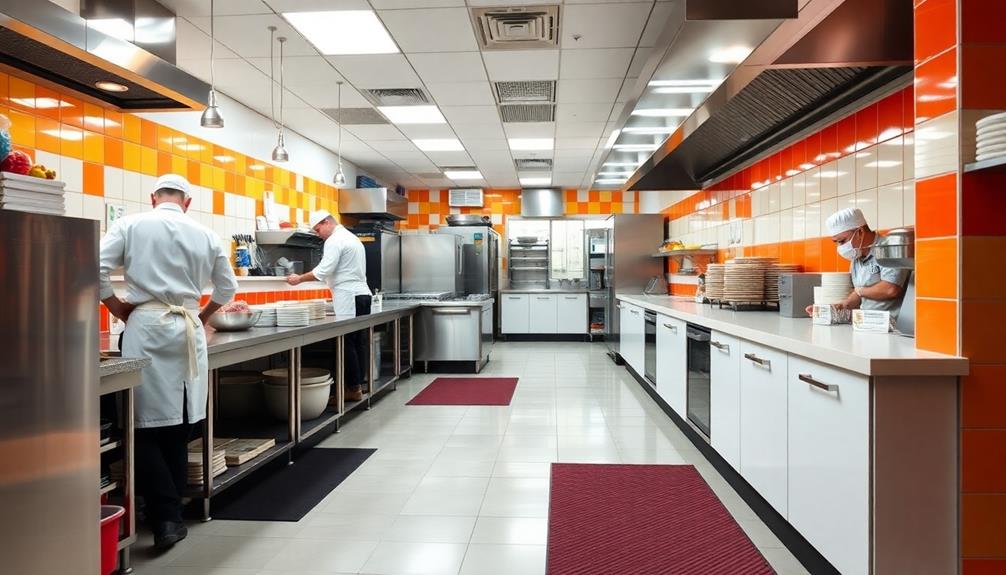
Choosing the right flooring for your restaurant kitchen is essential to maintaining safety, hygiene, and efficiency. Among the top flooring options available for commercial kitchens, epoxy flooring stands out for its durability and stain resistance. With a lifespan of 10-15 years, it's perfect for high-traffic areas and can be customized to fit your aesthetic.
Additionally, selecting the best flooring can contribute to ideal comfort in varying work conditions, enhancing overall staff productivity and satisfaction, as seen with top-rated heat pumps.
Ceramic tile flooring offers a classic look and durability, but it requires careful installation and maintenance, with potential costs reaching up to $5K annually due to cracked tiles.
If you're looking for a cost-effective solution, vinyl flooring provides various styles and slip resistance. However, it's less durable and may need frequent replacement.
Concrete flooring is another robust option, resistant to heat and impacts, but it often requires an epoxy coating for hygiene. Keep in mind that its hard surface could lead to discomfort for your staff.
Finally, rubber flooring excels in slip resistance and cushioning, making it suitable for kitchen environments, although it may deteriorate over time and necessitate regular maintenance to keep food particles at bay.
Each of these flooring systems has its pros and cons, so choose wisely based on your restaurant's specific needs.
JetRock Epoxy Flooring Overview
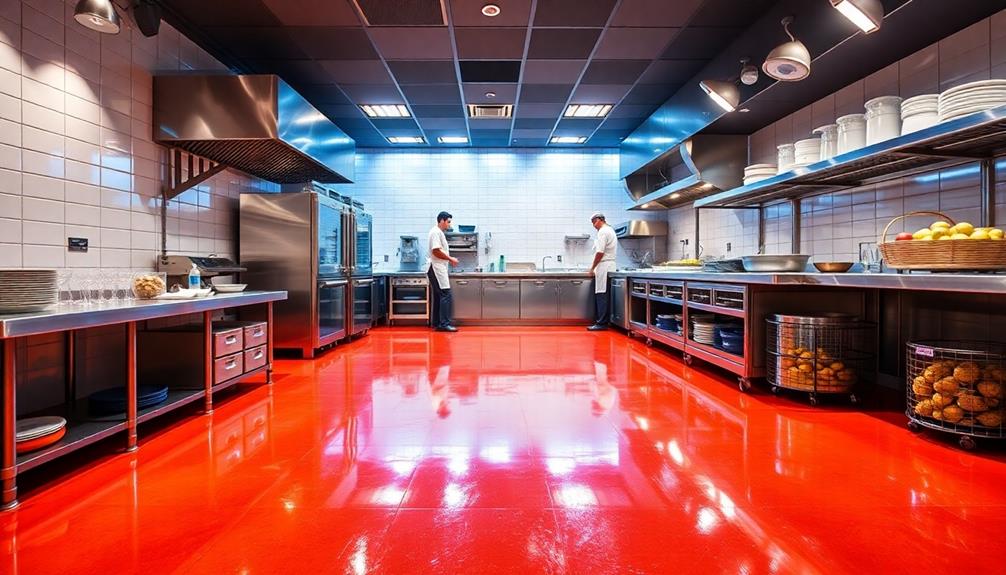
JetRock Epoxy Flooring is often regarded as one of the best options for restaurant kitchens due to its unique composition of durable quartz chips and epoxy resin. This flooring stands out for several reasons that make it ideal for commercial kitchen floors, including its resistance to heavy appliance use, which is essential in busy environments where appliances can draw standby power.
- Highly Durable: JetRock is designed to withstand the daily rigors of food production, ensuring a long-lasting surface.
- Seamless and Watertight Design: Its seamless nature prevents moisture infiltration and discourages microbial growth, creating a hygienic workspace.
- Quick Installation Process: You can have JetRock flooring installed overnight, greatly reducing operational downtime and allowing you to resume service quickly.
- Cost-effective: With a lifespan of 10-15 years, it's a long-term investment. The cost ranges from $6-8 per square foot for materials and $9-14 when including installation.
Incorporating JetRock Epoxy Flooring into your restaurant kitchen not only enhances durability but also maintains cleanliness. This combination of features truly makes it a top choice for those in the food service industry.
Advantages of Ceramic Tile Flooring

While many flooring options exist for restaurant kitchens, ceramic tile flooring stands out due to its impressive durability and ease of maintenance. Ceramic tiles are well-known for resisting wear and tear, making them ideal for high traffic areas. Unlike some materials, ceramic is non-porous, which means it's easy to clean and doesn't absorb spills or stains. This feature is essential in a busy kitchen where accidents can happen.
Additionally, ceramic tiles offer excellent heat resistance, allowing you to place hot pots and pans directly on the floor without worrying about damage. You'll appreciate the variety of styles and finishes available, enabling you to customize the look of your kitchen while ensuring functionality.
Though grout lines may present some common issues, individual tiles can be replaced with ease, minimizing disruption to your kitchen operations.
Concrete Flooring Benefits and Drawbacks
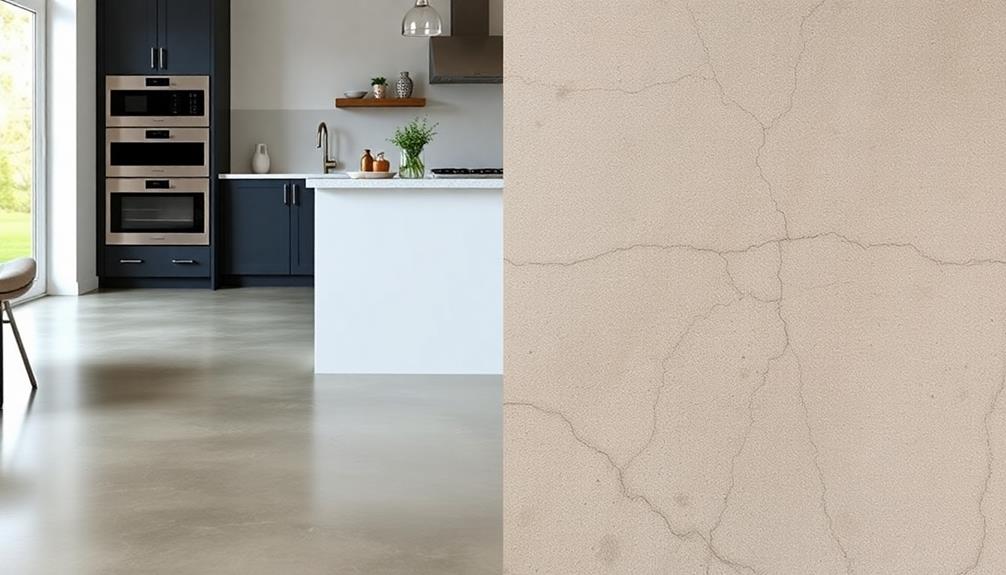
Concrete flooring offers impressive durability and longevity, making it a solid choice for bustling restaurant kitchens.
However, you'll face cleaning and maintenance challenges, as bare concrete can be porous and may require regular resealing to keep it hygienic.
While the initial cost might be low, consider the long-term upkeep to truly assess its value.
Durability and Longevity
Durability is an essential factor in selecting flooring for a restaurant kitchen, and concrete stands out as a top contender. With its ability to resist heat, impacts, and heavy machinery, concrete flooring is perfect for the demanding environment of your kitchen.
When properly maintained, its longevity can exceed 20 years, making it a wise investment.
Here are some key benefits of concrete flooring for your restaurant kitchen:
- Durability: Concrete withstands the daily wear and tear of a busy kitchen.
- Hygiene: With an epoxy coating, concrete helps prevent bacteria buildup, ensuring a safer food prep area.
- Cost-Effective: While installation costs range from $6 to $12 per square foot, the long lifespan and reduced maintenance demands lead to significant savings over time.
- Safety: The addition of non-slip treatments mitigates the risk of slips and falls, enhancing safety for your staff.
Cleaning and Maintenance Challenges
Maintaining a clean and safe restaurant kitchen can be a challenge with concrete flooring. While concrete is durable and can withstand heavy impacts, its porous nature can trap grease and grime, leading to bacteria accumulation if not properly sealed. Regular cleaning and maintenance are essential, and applying epoxy flooring can enhance hygiene by creating a non-porous surface.
However, cleaning concrete flooring can be labor-intensive, especially if spills and stains aren't addressed quickly. You'll also need to be cautious, as the surface can become slippery when wet, posing safety risks for your staff. Using rubber mats can help alleviate this issue, providing extra traction and comfort for employees who spend long hours standing.
Despite its cost-effectiveness during installation, neglecting maintenance could lead to higher long-term expenses, including the potential need for resurfacing.
As a result, balancing the benefits with the cleaning and maintenance challenges is vital for ensuring a safe and efficient kitchen environment. Taking these factors into account will help you make an informed decision about whether concrete flooring is suitable for your restaurant kitchen.
Consulting Flooring Professionals
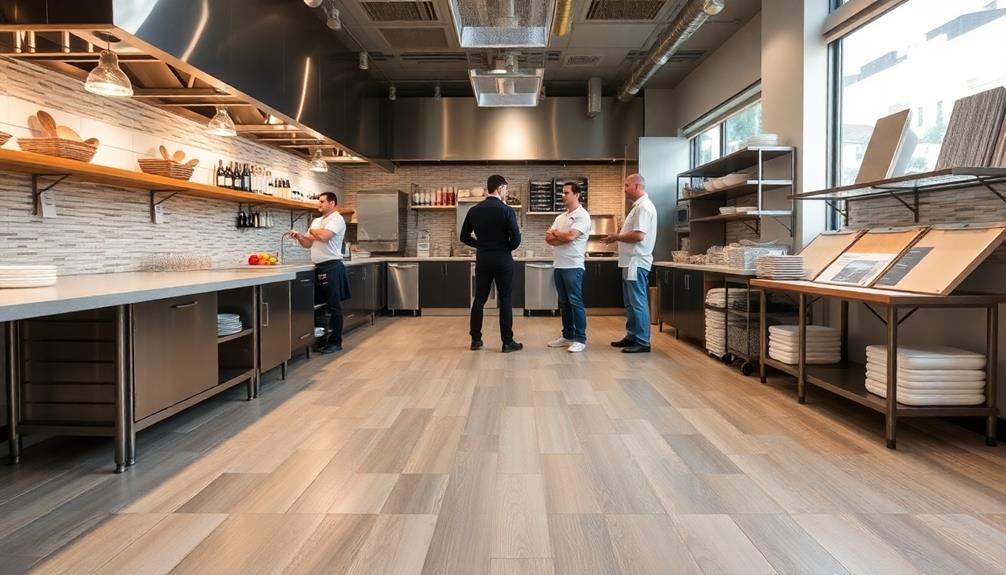
When you consult flooring professionals, you gain access to tailored solutions that meet the unique demands of your restaurant kitchen.
Their expert guidance guarantees you choose the right materials while considering factors like traffic and sanitation.
Plus, they can help streamline installation, making the entire process smoother for you.
Tailored Flooring Solutions
Maneuvering the complex landscape of restaurant kitchen flooring can be overwhelming, but consulting flooring professionals simplifies the process. They offer tailored solutions that meet your kitchen's unique needs, considering factors like traffic, spills, and sanitation standards.
Here are four ways they can assist you:
- Expert Guidance: Flooring professionals can recommend the most suitable flooring options, such as epoxy resin or resilient flooring, based on durability and maintenance.
- Material Assessment: They'll evaluate environmental conditions like moisture levels and temperature fluctuations to suggest the best materials for longevity and safety.
- Informed Decisions: A consultation allows you to view and feel different flooring types, helping you choose what aligns with your aesthetic preferences and operational requirements.
- Cost Efficiency: Investing time in professional advice can lead to long-term savings by selecting durable flooring that requires less frequent replacement and maintenance.
Expert Installation Guidance
How can you guarantee your restaurant kitchen flooring is installed correctly and efficiently? By seeking expert installation guidance from flooring professionals. They understand the unique demands of a restaurant kitchen and can tailor flooring solutions to meet safety regulations and operational needs.
When you consult with experts, they'll provide insights on various flooring options, including commercial vinyl, epoxy, and their durability. They'll also discuss maintenance requirements, ensuring you choose a floor that not only looks good but also withstands the hustle and bustle of a busy kitchen.
Professional installation minimizes downtime, with many options like epoxy flooring being installed overnight. Flooring professionals assess your kitchen's specific environmental conditions, such as moisture levels and foot traffic, to recommend the best materials. This targeted approach guarantees that your flooring can handle the challenges of a restaurant kitchen.
Engaging experienced installers can enhance the long-term performance of your flooring, ultimately improving your ROI. They'll guide you through maintenance practices that extend the life of your chosen flooring system.
With their expertise, you can feel confident that your restaurant kitchen flooring will be both functional and durable.
Frequently Asked Questions
What Is the Best Type of Flooring for a Restaurant Kitchen?
Choosing the right flooring for your restaurant kitchen involves considering durability, maintenance, and comfort. You'll want something that withstands heavy traffic, is easy to clean, and keeps your staff safe and comfortable during long shifts. Additionally, it’s important to consider the overall aesthetic of your restaurant when choosing flooring. For example, a sleek and modern kitchen might benefit from a polished concrete floor, while a cozy and rustic establishment might be better suited to durable tile or vinyl. Ultimately, the right flooring can enhance the dining experience for your customers, whether they’re enjoying casual oceanfront dining experiences or a formal evening out.
What Flooring Do You Need in a Commercial Kitchen?
What's more important than safety in a commercial kitchen? You need flooring that's durable, slip-resistant, and easy to clean. Choosing hygienic materials guarantees compliance while providing a long-lasting investment that makes your kitchen thrive.
What Is the Best Floor Coating for a Commercial Kitchen?
When choosing the best floor coating for a commercial kitchen, consider options like epoxy or urethane concrete. They're durable, easy to clean, and resistant to stains and chemicals, ensuring a safe, long-lasting environment.
What Is the Most Durable Flooring for Kitchens?
Think of your kitchen floor as a sturdy shield against chaos. For durability, you'll want epoxy or concrete; they resist wear and tear, ensuring your space stands strong against spills, heat, and heavy foot traffic.
Conclusion
When choosing the best flooring for your restaurant kitchen, remember that durability and slip resistance are key. Did you know that nearly 60% of restaurant accidents involve slips and falls? Investing in the right flooring can greatly reduce these risks, keeping your staff safe and your kitchen efficient. Whether you go for JetRock epoxy, ceramic tile, or concrete, make sure to reflect on your specific needs and consult flooring professionals for the best results.
